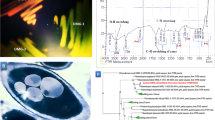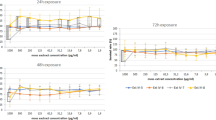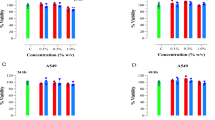Abstract
Two phytomitogens have been described which stimulate blastogenesis and mitosis of human peripheral blood lymphocytes: phytohaemagglutinin (PHA) from Phaseolus vulgaris1 and pokeweed mitogen (PWM) of Phytolacca americana2. Recently we have discovered mitogenic Properties in seed extracts of Wistaria floribunda (syn.: Wisteria floribunda, Japanese wisteria).
This is a preview of subscription content, access via your institution
Access options
Subscribe to this journal
Receive 51 print issues and online access
$199.00 per year
only $3.90 per issue
Buy this article
- Purchase on SpringerLink
- Instant access to full article PDF
Prices may be subject to local taxes which are calculated during checkout
Similar content being viewed by others
References
Nowell, P. C., Cancer Res., 20, 462 (1960).
Farnes, P., Barker, B. E., Brownhill, L. E., and Fanger, H., Lancet, ii, 1100 (1964).
Barker, B. E., and Farnes, P., Nature, 214, 787 (1967).
Börjeson, J., Reisfeld, R., Chessin, L. N., Welsh, P., and Douglas, S. D., J. Exp. Med., 124, 859 (1966).
Author information
Authors and Affiliations
Rights and permissions
About this article
Cite this article
BARKER, B., FARNES, P. Mitogenic Property of Wistaria floribunda Seeds. Nature 215, 659–660 (1967). https://doi.org/10.1038/215659a0
Received:
Issue date:
DOI: https://doi.org/10.1038/215659a0
This article is cited by
-
Phytomitogens and lymphocyte blastogenesis
In Vitro (1969)



